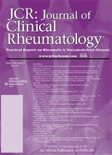
JCR-JOURNAL OF CLINICAL RHEUMATOLOGY
Scope & Guideline
Empowering Professionals Through Cutting-edge Research
Introduction
Aims and Scopes
- Clinical Management of Rheumatic Diseases:
The journal emphasizes research aimed at improving clinical management practices for various rheumatic diseases, including rheumatoid arthritis, lupus, and scleroderma. This includes studies on treatment efficacy, safety, and patient adherence. - Autoimmune Disease Mechanisms:
Research exploring the underlying mechanisms of autoimmune diseases is a core focus, including studies on genetic, immunological, and environmental factors that contribute to disease pathogenesis. - Innovative Therapies and Treatments:
The journal publishes studies on novel therapies, including biologics and targeted disease-modifying treatments, aiming to evaluate their efficacy and safety in real-world settings. - Patient-Reported Outcomes and Quality of Life:
Research on patient-reported outcomes and quality of life measures is a significant area, highlighting the importance of patient perspectives in the management of rheumatic diseases. - Epidemiology and Health Disparities:
The journal also addresses epidemiological studies and health disparities in the context of rheumatic diseases, focusing on demographic variables and access to care.
Trending and Emerging
- Telehealth and Remote Care:
The COVID-19 pandemic has accelerated the adoption of telehealth in rheumatology, leading to a surge in research focusing on the effectiveness and patient experiences with remote care. - Mental Health and Psychosocial Factors:
There is a growing body of research exploring mental health and psychosocial factors as they relate to rheumatic diseases, emphasizing the importance of holistic patient care. - Integration of Technology in Care:
Emerging studies are focusing on the integration of technology, such as mobile health applications and telemonitoring, into rheumatology practice to improve patient outcomes. - Diversity and Health Equity:
Research examining health disparities and the effects of social determinants of health within rheumatic disease populations is on the rise, highlighting the need for equitable healthcare access. - Longitudinal Studies and Real-World Evidence:
There is an increasing trend toward longitudinal studies and real-world evidence that provide insights into long-term treatment outcomes and disease progression in diverse patient populations.
Declining or Waning
- Traditional Pharmacological Treatments:
There has been a notable decrease in studies focusing solely on traditional pharmacological treatments for rheumatic diseases, as the field shifts towards exploring biologics and personalized medicine. - Historical Case Reports:
The publication of historical case reports has waned, reflecting a trend towards more robust clinical trials and cohort studies that provide stronger evidence for treatment efficacy. - Single-Center Studies:
There is a declining trend in single-center studies as the journal increasingly favors multicenter and larger cohort studies that enhance the generalizability of findings. - Basic Science Research:
The focus on basic science research within rheumatology appears to be diminishing, with a greater emphasis on clinical applications and implications for practice.
Similar Journals

SEMINARS IN ARTHRITIS AND RHEUMATISM
Pioneering insights in the field of rheumatology.SEMINARS IN ARTHRITIS AND RHEUMATISM, published by W B Saunders Co-Elsevier Inc, is a leading journal in the fields of rheumatology and pain medicine. With an impressive impact factor and recognized as a Q1 journal in both its categories, it ranks #8 in Anesthesiology and Pain Medicine and #11 in Rheumatology based on the latest Scopus data, placing it within the top echelons of academic research. Established in 1971, this esteemed publication offers a comprehensive platform for researchers and practitioners to disseminate and engage with cutting-edge studies that advance the understanding and treatment of arthritis and related conditions. With its robust editorial process and focus on high-quality, peer-reviewed articles, the journal not only contributes to scientific knowledge but also serves as an essential resource for professionals and students seeking contemporary insights into effective management strategies and emerging therapies in the rheumatologic field. Although it does not offer open access, its subscription model ensures a wide distribution among academic and clinical institutions, reinforcing its significance in the research community.

International Journal of Rheumatic Diseases
Fostering breakthroughs in rheumatic disease research.The International Journal of Rheumatic Diseases, published by WILEY, serves as a crucial platform for disseminating high-quality research and advancements in the field of rheumatology. With an ISSN of 1756-1841 and an E-ISSN of 1756-185X, this journal has established itself within the academic community since its inception in 2008, and it is set to continue until at least 2024. Positioned in the Q3 category of rheumatology, the journal holds a significant rank of #38 out of 73 in its field according to Scopus, showcasing its growing influence despite the competitive environment. The absence of Open Access reflects a traditional scholarly publishing model, allowing for meticulous peer-review processes to ensure the rigor and reliability of published studies. This journal aims to foster innovative research, critical reviews, and clinical studies, thereby contributing to a deeper understanding of rheumatic diseases and enhancing patient care. The dedicated readership, including researchers, healthcare professionals, and students, will find valuable insights into the latest findings and methodologies relevant to rheumatology in the journal's comprehensive articles.

ACR Open Rheumatology
Connecting the global rheumatology community through unrestricted access.ACR Open Rheumatology, published by WILEY, is a premier open-access journal dedicated to advancing the field of rheumatology. Since its inception in 2019, this journal has rapidly gained recognition, achieving a Q1 category ranking in the 2023 Scopus Quartiles, positioning it among the top 30% within its discipline. With a current Scopus rank of 22 out of 73 in Medicine - Rheumatology and an impressive 70th percentile, ACR Open Rheumatology serves as a vital platform for researchers and clinicians to disseminate knowledge on the latest developments in rheumatic diseases and treatments. The journal promotes unrestricted access to cutting-edge research, thus fostering collaboration and innovation in the rheumatological community. Situated in the United States, it caters to a global audience, encouraging submissions from researchers worldwide and addressing critical health issues that affect millions. We invite professionals, students, and researchers alike to engage with the transformative findings published in our journal.

Reumatologia Clinica
Pioneering the path to innovative rheumatology treatments.Reumatologia Clinica is a distinguished journal dedicated to the field of Rheumatology, published by Elsevier España SLU. With its ISSN of 1699-258X and E-ISSN 1885-1398, the journal aims to disseminate pivotal research findings and clinical studies from 2005 to 2024, spotlighting advancements in the understanding and treatment of rheumatic diseases. Based in Barcelona, Spain, it plays a vital role in the academic community, ranking in the Q3 category for Rheumatology as of 2023, with a Scopus ranking of #44 out of 73, placing it in the 40th percentile. Although it operates under a traditional access model, the journal is committed to academic excellence, providing researchers, healthcare professionals, and students with invaluable insights that drive the field forward. Reumatologia Clinica serves as an essential resource for those looking to deepen their knowledge and contribute to the evolving landscape of rheumatologic research.

Advances in Rheumatology
Unlocking the potential of rheumatology through open access.Advances in Rheumatology is a premier open-access journal published by BMC, dedicated to advancing the field of rheumatology through high-quality, peer-reviewed research. Launched in 2018, the journal has quickly established itself within the academic community, achieving a commendable Q2 ranking in the category of Rheumatology as of 2023 and ranking #34 out of 73 in the Scopus Medicine Rheumatology listings, placing it in the 54th percentile. With a focus on innovative treatments, patient care, and the latest in rheumatological research, the journal provides a platform for researchers and clinicians to disseminate their findings and foster collaborative advancements in this critical area of medicine. Recognized for its accessibility, the journal follows an open-access model, ensuring that research is freely available to a global audience. With a commitment to high standards of academic rigor, Advances in Rheumatology plays a vital role in enhancing the understanding and treatment of rheumatic diseases, making it an invaluable resource for researchers, professionals, and students alike.

Reumatismo
Connecting researchers and practitioners in the world of rheumatology.Reumatismo is a distinguished Open Access journal dedicated to the field of rheumatology, published by PAGEPRESS PUBL since 2001. With a rich history dating back to 1952, this journal has been pivotal in disseminating vital research on rheumatic diseases and related disorders. Based in Italy, Reumatismo has earned a reputation for its quality and relevance, achieving a Q3 category ranking in the 2023 Scopus metrics for Rheumatology, reflecting its significant contributions to the field. The journal is committed to providing a platform for the latest scientific developments and clinical innovations, thus aiding researchers, healthcare professionals, and students striving to enhance understanding and treatment of rheumatic conditions. For those seeking to access comprehensive research articles and studies, Reumatismo boasts an open access policy, ensuring that knowledge is freely available to all, fostering collaboration and advancement in rheumatology worldwide.

Egyptian Rheumatologist
Unlocking the potential of musculoskeletal research.The Egyptian Rheumatologist is a peer-reviewed Open Access journal dedicated to advancing the field of rheumatology. Published by Elsevier since 2011, the journal aims to disseminate high-quality research, clinical innovations, and reviews that cover a wide range of topics related to autoimmune diseases, arthritis, and musculoskeletal disorders. With an ISSN of 1110-1164 and an E-ISSN of 2090-2433, it has achieved a respectable rank of #50 out of 73 in the medicine/rheumatology category according to Scopus, positioning it in the 32nd percentile among its peers. Operating from its base in Amsterdam, Netherlands, the journal provides an accessible platform for researchers, professionals, and students, encouraging a collaborative exchange of cutting-edge knowledge that is essential for the ongoing developments in rheumatologic care and research. The Open Access model ensures that critical findings and advancements are available to a global audience, fostering further research and education within this vital field.

Journal of Rheumatic Diseases
Unlocking the potential of rheumatology through shared knowledge.Journal of Rheumatic Diseases, published by the Korean College of Rheumatology, stands as a pivotal platform in the field of rheumatology, contributing significantly to the advancement of knowledge and clinical practice since its inception. With an impact factor reflecting its esteemed position in the academic community, this open-access journal promotes accessibility to high-quality research, ensuring that groundbreaking discoveries are reachable to all stakeholders in the realm of rheumatic diseases. The journal has maintained its commitment to quality, evidenced by its ranking in the Q3 category for Rheumatology in 2023, and its presence among the top quartiles of medical research. Focusing on innovative therapeutic approaches, emerging diagnostic techniques, and comprehensive reviews, the Journal of Rheumatic Diseases seeks to foster collaboration and dialogue among researchers, clinicians, and students alike. For accessibility, the journal offers numerous articles since its transition to open access in 2017, thereby facilitating research dissemination across the globe. As it converges over the years from 2019 to 2024, the journal promises to be instrumental in shaping the future of rheumatic disease research, inviting contributions that inspire new frontiers in this essential field.

European Journal of Rheumatology
Pioneering Discoveries for Better Patient CareEuropean Journal of Rheumatology is a premier, peer-reviewed journal that has been paving the way for innovative research and in-depth analysis in the field of rheumatology since its launch. Published by AVES, this Open Access journal has been accessible to researchers, professionals, and students worldwide since 2014, promoting the sharing of valuable knowledge on rheumatic diseases and their treatment. With an ISSN of 2147-9720 and an E-ISSN of 2148-4279, it provides a prominent platform for groundbreaking studies and clinical evaluations that bridge scientific discovery with practical application. The journal’s mission is to enhance the understanding of rheumatological conditions and facilitate advancements in therapeutic strategies, making it an essential resource for anyone devoted to the improvement of patient care in this dynamic field. The European Journal of Rheumatology is committed to upholding the highest standards of scholarly publishing and aims to foster collaboration among researchers and practitioners across Europe and beyond.

Pediatric Rheumatology
Unlocking new horizons in pediatric immunology and rheumatology.Pediatric Rheumatology is a leading peer-reviewed open access journal published by BMC, dedicated to disseminating high-quality research in the field of pediatric rheumatology. Since its inception in 2007, the journal has established itself as a vital resource for healthcare professionals, researchers, and students focused on pediatric immunology, rheumatology, and child health, maintaining an impressive Q1 ranking in Pediatrics and Q2 in Immunology and Allergy as well as Rheumatology for 2023. It is recognized for its impact on advancing knowledge and clinical practice, with significant contributions noted in various studies and case reports. With access options that embrace the ethos of open science, all articles published in Pediatric Rheumatology are freely available, promoting collaborative research and discussion among practitioners across the globe. The journal welcomes submissions that encapsulate innovative research, clinical trials, and reviews that address both current challenges and advancements within the pediatric rheumatology landscape.